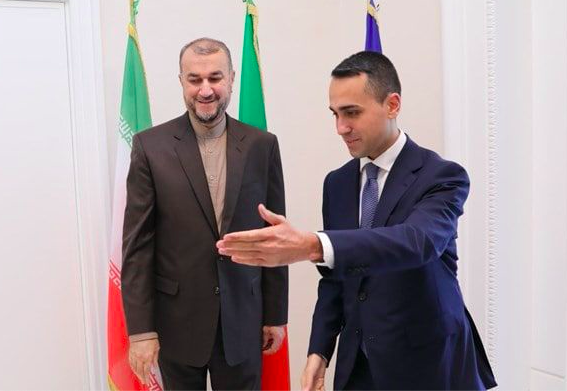L’Italia e il suo rappresentante per gli Esteri, Luigi Di Maio, in un frangente di tensioni crescenti internazionali, gioca il solito ruolo di Paese privo di dignità e di una reale linea politica, invitando a Roma il ministro degli Esteri iraniano, Hossein Amirabdollahian. Non a caso, la visita di Amirabdollahian giunge mentre la questione del ripristino dell’accordo sul nucleare iraniano si incrocia con l’emergenza energetica in Europa.
L’Italia, i cui rappresentanti istituzionali hanno ancora in corso un “tour” in Africa dove elemosinare le risorse venute meno dalla Russia, tenderà a ripristinare una nuova intesa con Teheran, il primo a livello europeo.
L’eventuale accordo con l’Iran, terzo produttore di gas naturale al mondo, nonché produttore di petrolio, potrebbe però incrinare i rapporti con Israele, naturale partner di Roma, la cui amicizia è consolidata e frutto di import-export a tutti i livelli, compreso quello della fornitura all’Italia di gas dalle piattaforme offshore di Gerusalemme, ultimamente oggetto di attacchi di Hezbollah proprio con droni forniti da Teheran.
Ma a dire dell’agenzia iraniana Irna, il capo della diplomazia di Teheran, durante la visita a Roma ha in agenda colloqui “su questioni internazionali, regionali e bilaterali” e in particolare “il proseguimento della cooperazione economica e politica”.
Il ministro degli Esteri iraniano, si recherà anche in Vaticano dove verrà ricevuto dal segretario di Stato cardinal Pietro Parolin e dal segretario per i rapporti con gli Stati, monsignor Gallagher.
Una prima reazione all’annuncio della sgradita visita, è giunta dal deputato di Forza Italia, membro della Commissione esteri, Andrea Orsini che, in una nota stampa ha dichiarato: “Il ministro degli Esteri dell’Iran, Hossein Amirabdollahian, sarà domani in visita ufficiale nel nostro Paese per dare seguito alla cooperazione politica, economica e commerciale con l’Italia. Sono a tutti noti gli stretti legami del ministro Amirabdollahian con la Forza Quds e con i gruppi sciiti anti-israeliani finanziati dall’Iran nella regione, come gli Hezbollah libanesi e negli anni sono state ripetute le sue esternazioni contro Israele, di cui auspicava la scomparsa”.
“Certo, la volontà anche italiana di espandere ulteriormente le relazioni bilaterali fra i nostri Paesi è tanta, ma auspico – aggiunge Orsini- che il ministro Di Maio voglia cogliere l’occasione per ribadire la nostra posizione al fianco di Israele e del suo diritto di esistere e di difendersi e per chiedere a Teheran di smettere di finanziare il terrorismo internazionale di fomentare l’instabilità regionale per mezzo dei suoi accoliti”.
“L’Iran è stato elemento di forte destabilizzazione della regione, protettore del terrorismo e dell’estremismo violento. Ma se davvero l’Iran vorrà giocare un ruolo importante nello scacchiere medio orientale deve comprendere che è anacronistico perseverare nell’odio verso Israele mentre è più proficuo, come stanno facendo altri Paesi arabi, aprire ad una nuova stagione basata sul dialogo, sulla fiducia e sul rispetto reciproco”, conclude Orsini.
Giunge anche una nota dell’Ambasciata di Israele in Italia, dove si legge: “Mentre il ministro degli Esteri iraniano è in visita in Italia, abbiamo il dovere di ricordarvi che l’Iran continua a ingannare il mondo. L’Iran non è mai lontano da qualsiasi luogo dove si trovi il terrorismo. La ricerca di capacità nucleari militari da parte dell’Iran non è mai cessata. L’Iran continua a violare sistematicamente tutti i suoi impegni internazionali e opera instancabilmente per nascondere le prove e turbare le indagini, al fine di ingannare la comunità internazionale. Israele ha accolto favorevolmente la risoluzione del Consiglio Direttivo dell’Agenzia Internazionale per l’Energia Atomica – adottata a stragrande maggioranza – che chiede all’Iran di adempiere urgentemente ai suoi obblighi legali relativi alle sue violazioni delle garanzie. La comunità internazionale non può permettersi la presenza di un Iran nucleare, che condurrebbe a un sentiero di terrore e distruzione”.
Ma alle reazioni politiche, vanno aggiunti gli ultimi eventi che hanno visto protagonista il regime degli ayatollah.
Proprio ieri a Teheran, il regista 62enne Jafar Panahi è stato “arrestato dopo essersi recato alla procura locale per avere aggiornamenti sul caso di un altro regista”, come ha riferito l’agenzia di stampa iraniana Mehr. “Non ci sono ancora informazioni sul motivo dell’arresto di Panahi, né sul suo legame con il caso Rasoulof Mohammad o con altre persone arrestate la scorsa settimana”, ha aggiunto l’agenzia di stampa.
Nella scorsa settimana, tra i vari fermati figura anche il collega di Panahi, il regista Mostafa Aleahmad.
Ma Panahi non è nuovo a questo tipo di esperienza essendo stato arrestato nel 2010 e condannato a sei anni di carcere per “propaganda contro il sistema” a causa del suo sostegno al movimento di protesta formatosi l’anno precedente dopo la rielezione alla presidenza della Repubblica Islamica Mahmud Ahmadinejad, dal profilo ultraconservatore.
Oltre alla repressione dei dissidenti all’interno dei confini, Teheran ha lavorato anche per ottenere l’estradizione del terrorista Assadollah Assadi, un diplomatico addetto all’ambasciata di Vienna coinvolto in un tentativo di attentato contro i dissidenti del Mek (Mojaheddin-e-khalk, i soldati del popolo) a Parigi durante un loro convegno. Arrestato in Belgio e condannato a 20 anni.
La Camera dei rappresentanti belga di Bruxelles in questi giorni sta analizzando il suo caso e, nonostante le pressioni dell’opinione pubblica, intenderebbe adottare nei suoi confronti la procedura di estradizione, come richiesto dall’Iran. Una sentenza disgustosa che, oltretutto, costituirebbe un precedente assai pericoloso, che incoraggerebbe la teocrazia religiosa di Teheran a intensificare la repressione e gli attacchi terroristici.
HERE THE ENGLISH VERSION
Italy and its foreign representative Luigi Di Maio, in a time of growing international tensions, play the usual role of a country devoid of dignity and a true political line, inviting Iranian Foreign Minister Hossein Amirabdollahian to Rome.
It is no coincidence that Amirabdollahian’s visit comes just as the issue of restoring the Iranian nuclear deal is going through the energy emergency in Europe.
Italy, whose institutional representatives are still “around” in Africa where they can beg for the resources that Russia lacks, will tend to re-establish a new agreement with Tehran, the first at European level.
The possible agreement with Iran, the world’s third largest producer of natural gas, as well as oil producer, could however damage relations with Israel, a natural partner of Rome, whose friendship is consolidated and the result of import-export at all levels, including that of supplying Italy with gas from offshore platforms in Jerusalem, recently the target of Hezbollah attacks with drones supplied by Tehran.
But according to the Iranian agency Irna, the head of diplomacy in Tehran, during his visit to Rome, has talks on his agenda “on international, regional and bilateral issues” and in particular “the continuation of economic and political cooperation”.
The Iranian Foreign Minister will also go to the Vatican where he will be received by the Secretary of State Cardinal Pietro Parolin and the Secretary for Relations with States, Monsignor Gallagher.
An initial reaction to the announcement of the unwelcome visit came from the Forza Italia deputy, member of the Foreign Affairs Commission, Andrea Orsini who, in a statement, said: “The Iranian Foreign Minister, Hossein Amirabdollahian, will visit the minister tomorrow. Foreign Affairs The Amirabdollahs have close ties to the Quds Force and Iranian-funded Shiite anti-Israel groups in the region, such as the Lebanese Hezbollah, and over the years his speeches against Israel, which he hoped would disappear, have been repeated.
“Of course, the Italian will to further expand bilateral relations between our countries is great, but I hope – adds Orsini – that Minister Di Maio will take the opportunity to reaffirm our position alongside Israel and its right to exist. . and to defend itself and ask Tehran to stop financing international terrorism and foment regional instability through its acolytes. “” Iran has been an element of strong destabilization of the region, protector of terrorism and violent extremism But if Iran really wants to play an important role in the Middle East chessboard, it must understand that it is anachronistic to persevere in the hatred of Israel while it is more profitable, as other Arab countries are doing, to open a new season based on dialogue, trust. and mutual respect ”, concludes Orsini.
There is also a note from the Israeli Embassy in Italy, which reads that “While the Iranian Foreign Minister is visiting Italy, we have a duty to remind you that Iran continues to deceive the world. Iran never is. away from any place where terrorism is found.
Iran’s search for military nuclear capabilities has never ceased. Iran continues to systematically violate all of its international commitments and work tirelessly to conceal evidence and disrupt investigations in order to deceive the international community.
Israel has welcomed the resolution of the Governing Council of the International Atomic Energy Agency – adopted by an overwhelming majority – calling on Iran to urgently fulfill its legal obligations relating to its breaches of warranties.
The international community cannot afford the presence of a nuclear Iran, which would lead to a path of terror and destruction. ”
But to the political reactions we must add the latest events that have seen the regime of the ayatollahs protagonist.
Just yesterday in Tehran, 62-year-old director Jafar Panahi was “arrested after going to the local prosecutor for updates on another director’s case,” as reported by Iranian news agency Mehr.
“There is still no information on the reason for Panahi’s arrest, nor on his connection with the Rasoulof Mohammad case or with other people arrested last week,” the news agency added.
Last week, among the various arrested, there was also a colleague of Panahi, the director Mostafa Aleahmad.
But Panahi is no stranger to this kind of experience having been arrested in 2010 and sentenced to six years in prison for “propaganda against the system” for his support for the protest movement that formed the previous year after his re-election to the presidency of the la Republic. Islamic Mahmud Ahmadinejad, with an ultra-conservative profile.
In addition to the repression of dissidents within the borders, Tehran also worked to obtain the extradition of the terrorist Assadollah Assadi, a diplomat attached to the Vienna embassy involved in an attempted attack on dissidents in the Mek (Mojahideen-e-khalk, soldiers of the people) in Paris during their meeting. Arrested in Belgium and sentenced to 20 years.
The Belgian House of Representatives in Brussels is currently analyzing his case and, despite pressure from public opinion, intends to adopt the extradition procedure against him, as requested by Iran.
A disgusting sentence which, moreover, would create a very dangerous precedent, which would encourage the religious theocracy of Tehran to intensify repression and terrorist attacks.








